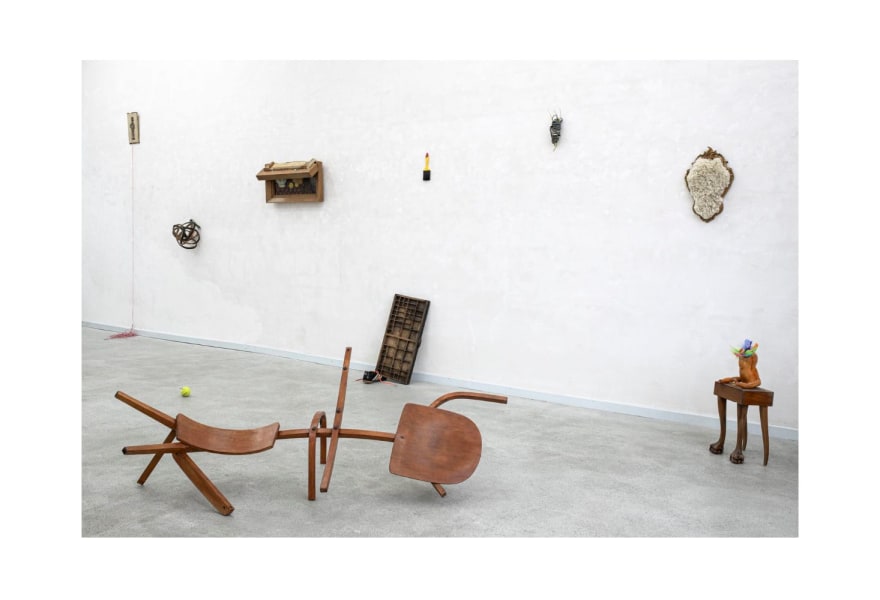14 january 2025, Yves Joris
Disrupting with a wink
In a world in which we increasingly regard objects and traditions as undisputable truths, Mohammed Alani (b. 1971, Baghdad) challenges these conventions with a playful and critical eye. His exhibition, 'Modified from its Original' at Shoobil Gallery, invites viewers to revisit everyday objects through interventions that render them both disorienting and poetic. It’s a lyrical journey through the transformation of mundane items in which Alani renders the essence of transience and reinterpretation palpable. His work reminds us that art is not merely a reflection of reality, but also an act of transformation and the imagination.
The power of transformation
The title 'Modified from its Original' is more than a description of the physical alterations Alani applies to everyday objects; it’s a philosophical invitation to reflect on the essence of change. He dissects objects, removes them from their original context and presents them with subtle modifications that shift their meaning.
In Compass Ballet (2020), a Persian carpet with circular cutouts loses its functional stability and becomes a sculptural object in which movement and imbalance take centre stage. This fragmentation underscores the notion that objects and traditions are rarely static. The cut-out shapes are not merely decorative, but interrupt the narrative continuity of the carpet, turning it into a new autonomous artwork.
This process of transformation is deeply rooted in assemblage art in which objects are removed from their original context and recombined. Alani’s work at times echoes the practices of Arman, Jean Tinguely and Panamarenko, yet without reverting to imitation. He does not merely dismantle objects, but rearranges them in ways that question their original function. A tennis ball with a stem resembling an apple or a mirror blackened to lose its reflective function are not just visual jokes, but challenge the viewer to reflect on perception, identity and the delicate boundary between functionality and art.

Mohammed Alani, herdsman, 2014, Shoobil
Between memory and the present
Alani’s work is deeply anchored in the tension between past and present. By using discarded objects with personal histories—such as carpets, chairs and everyday utensils—he reveals the traces of time. Each object carries a past, but in Alani’s hands, its original narrative is stripped away, giving it a new, open-ended meaning.
His decision to alter an Persian carpet carries a deeper cultural layer. In Middle Eastern tradition, carpets are not merely decorative items, but carriers of spiritual and cultural narratives. By literally breaking them apart, the artist questions not only the materiality of the object, but also its cultural weight. Is heritage only valuable in its original state or can it carry new meanings in a fragmented form? Alani seems to be inviting the viewer to view heritage as something dynamic, not bound to a single truth.
The tensions between continuity and change, between fragment and whole, run as a common thread throughout the exhibition. Each work invites introspection: Why do we value completeness? Can incomplete objects touch us just as deeply?

Mohammed Alani, compass ballet, 2020, Shoobil
Humour and poetry as weapons
What makes 'Modified from its Original' — and Alani’s work in general — so interesting is the subtle balance between philosophical depth and playful humour. He is highly adept at addressing such weighty themes as identity, transience and transformation with a lightness that does not intimidate, but invites reflection.
A chair completely deconstructed into a collapsed figure evokes both pity and wonder. It’s as if the object itself has become a character, a metaphor for vulnerability and the loss of functionality. This poetic absurdity is a powerful statement: art does not need to be serious to resonate deeply.
Here, humour is not a cheap joke, but a philosophical tool. It exposes the seriousness of the art world without losing intellectual substance. Alani poses questions that resonate both intellectually and emotionally: How do we view the incomplete and the discarded? Can beauty arise from the defective?
Biographical context
Mohammed Alani, born in 1971 in Baghdad, studied at the Academy of Fine Arts in Baghdad (1991–1997) and later at the Jean Jacques Gailliard Academy in Brussels (2007–2015). His artistic practice is deeply rooted in the idea of transformation and cultural dialogue. He uses everyday materials that are often overlooked — such as soap, cork balls and pencils — and places them in new contexts in which they symbolise human knowledge and continuity.
His work can be viewed as an ongoing quest for the connection between diversity and continuity, exploring how objects and their meanings shift over time. By removing materials from their context, he creates a visual dialogue that challenges the audience to draw its own interpretations.

Mohammed Alani, collided frame, 2024, Shoobil
The beauty of the incomplete
'Modified from its Original' is an exhibition that not only stimulates the viewer aesthetically, but also challenges intellectually. With simple interventions, Mohammed Alani raises profound questions about the nature of objects, heritage and perception. His art invites an open perspective in which imperfection is not seen as a flaw, but as a strength.
The exhibition at Shoobil Gallery will remain on view until 9 February 2025. It demonstrates that art is not solely about creating new forms, but also about reinterpreting what already exists. By breathing new life into discarded objects, Alani reminds us that beauty can be found in the incomplete, the broken and the imperfect—a powerful reflection on the human condition in which every fragment holds meaning.
